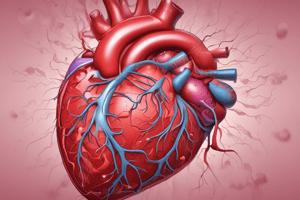Podcast
Questions and Answers
What is used to open blocked arteries?
What is used to open blocked arteries?
- A stent
- Both a and b (correct)
- A scalpel
- A balloon
What is recommended to manage stress?
What is recommended to manage stress?
- All of these (correct)
- Yoga
- Exercise
- Meditation
What is used to redirect blood flow around blocked arteries?
What is used to redirect blood flow around blocked arteries?
- Medications
- Bypass surgery (correct)
- Angioplasty
- Heart transplantation
Why is it essential to get regular check-ups?
Why is it essential to get regular check-ups?
What is the purpose of a heart transplantation?
What is the purpose of a heart transplantation?
What is the term for the damage to coronary arteries that can lead to heart attacks?
What is the term for the damage to coronary arteries that can lead to heart attacks?
What is a non-modifiable risk factor for cardiovascular disease?
What is a non-modifiable risk factor for cardiovascular disease?
What is a symptom of cardiovascular disease?
What is a symptom of cardiovascular disease?
What is the term for the inability of the heart to pump enough blood?
What is the term for the inability of the heart to pump enough blood?
What is a modifiable risk factor for cardiovascular disease?
What is a modifiable risk factor for cardiovascular disease?
What is the term for the disease of the heart muscle?
What is the term for the disease of the heart muscle?
Flashcards are hidden until you start studying
Study Notes
Definition and Types
- Cardiovascular diseases (CVDs) are a group of disorders that affect the heart and blood vessels.
- Types of CVDs:
- Coronary artery disease (CAD): damage to coronary arteries, leading to heart attacks.
- Cerebrovascular disease: damage to blood vessels in the brain, leading to stroke.
- Peripheral artery disease: damage to blood vessels in the legs and arms.
- Heart failure: inability of the heart to pump enough blood.
- Hypertension: high blood pressure.
- Cardiomyopathy: disease of the heart muscle.
- Heart valve disease: malfunction of heart valves.
Risk Factors
- Non-modifiable:
- Age: risk increases with age.
- Family history: genetic predisposition.
- Sex: males are at higher risk than females.
- Modifiable:
- Smoking: tobacco use increases risk.
- Physical inactivity: lack of exercise.
- Unhealthy diet: high intake of saturated fats, sodium, and added sugars.
- Obesity: excess body weight.
- High blood pressure: hypertension.
- High cholesterol: elevated levels of low-density lipoprotein (LDL) cholesterol.
- Diabetes: high blood sugar levels.
- Stress: chronic stress can increase risk.
Signs and Symptoms
- Chest pain or discomfort (angina).
- Shortness of breath (dyspnea).
- Fatigue.
- Dizziness or lightheadedness.
- Palpitations or irregular heartbeat.
- Swelling in the legs, ankles, or feet.
- Pain or numbness in the legs or arms.
Diagnosis and Treatment
- Diagnosis: medical history, physical examination, blood tests, electrocardiogram (ECG), echocardiogram, and imaging tests (e.g., MRI, CT scan).
- Treatment:
- Lifestyle modifications: healthy diet, regular exercise, stress management, and smoking cessation.
- Medications: to control blood pressure, cholesterol, and blood sugar levels.
- Angioplasty: opening blocked arteries using a balloon or stent.
- Bypass surgery: redirecting blood flow around blocked arteries.
- Heart transplantation: in severe cases.
Prevention
- Maintain a healthy weight.
- Engage in regular physical activity.
- Eat a balanced diet low in saturated fats, sodium, and added sugars.
- Manage stress.
- Quit smoking.
- Limit alcohol consumption.
- Get regular check-ups to monitor blood pressure, cholesterol, and blood sugar levels.
Studying That Suits You
Use AI to generate personalized quizzes and flashcards to suit your learning preferences.




